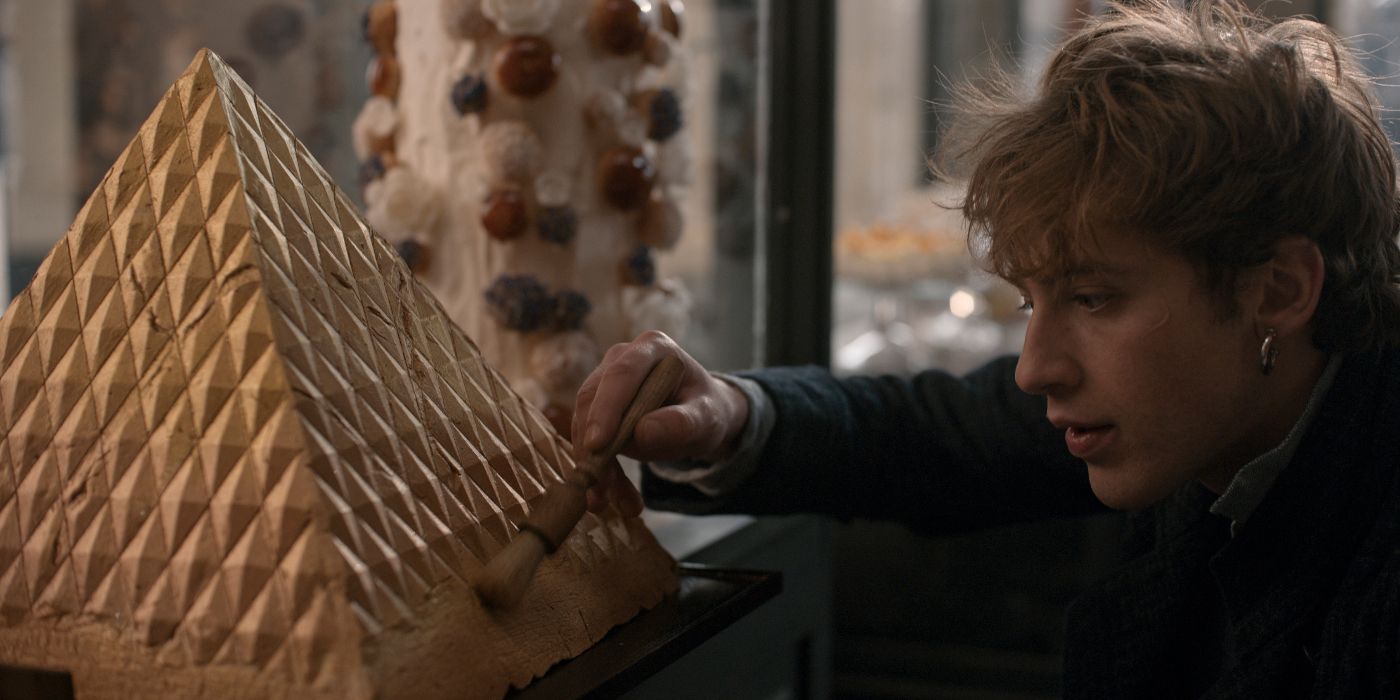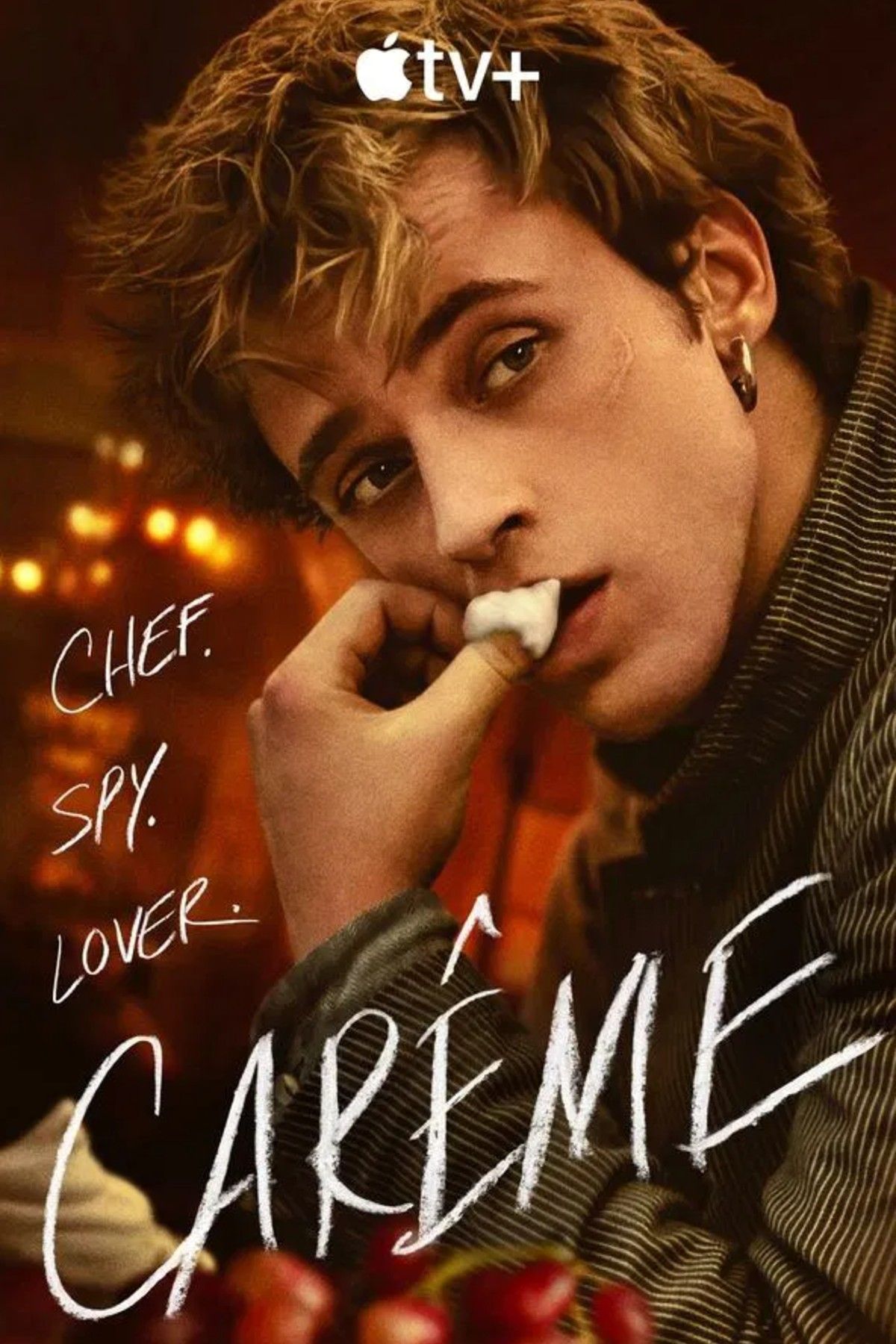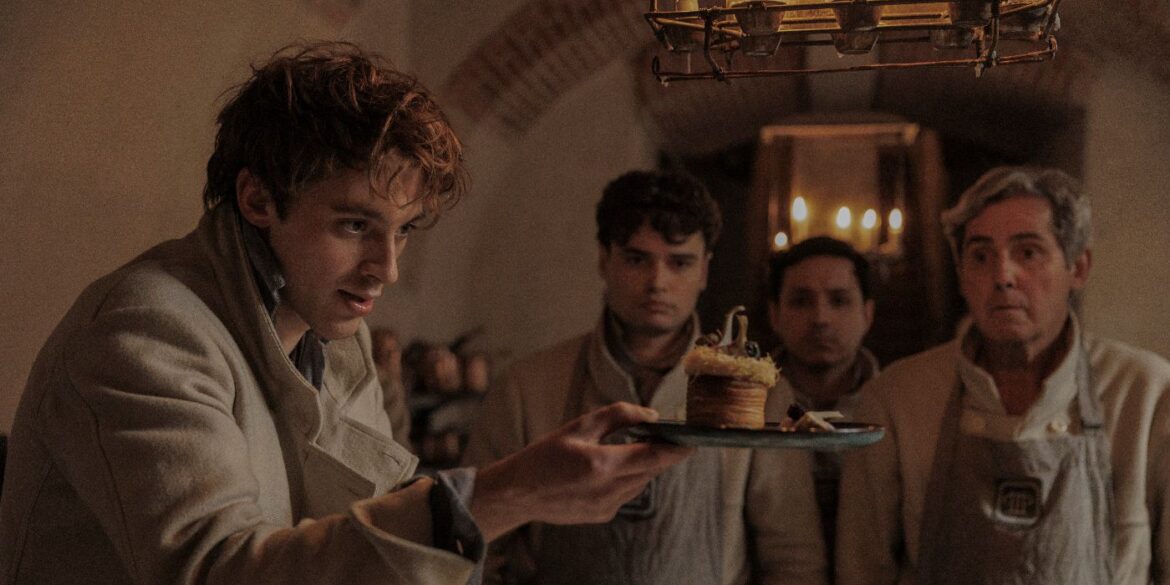Humans share many common denominators, but few of our driving forces hold more power than food. At its best, food denotes stability and comfort. Eating the right dish, made by the right hands, evokes memories of specific people and periods: childhood summers improved by dad’s mouth-watering chili and its secret sauce ingredients, for example, or the handwritten gumdrop cookies recipe passed down between generations. Giving food to someone else, be they a loved one or a stranger, is selfless provision; to that end, a meal can look terrible and nourish the soul, because we know the effort matters most. Conversely, totalitarian regimes try to control their populations through starvation. Divorced from either of these extremes, food can also carry cultural significance, represent artistic expression, or be a carefree aphrodisiac, if you’re into that sort of thing.
Apple TV+’s newest French-language drama, Carême, attempts to tackle all of the above and more through the lens of a historical figure hailed as “the world’s first celebrity chef”: Antonin Carême (Benjamin Voisin), born Marie-Antoine Carême. If you enjoy haute cuisine or marathoned enough of The Great British Baking Show to recognize some of the baking world’s commonplace techniques, then you have this 18th-century innovator to thank. The vol-au-vent, the croquembouche, even the white toque hats — Carême either invented or perfected them all. But he wasn’t just a celebrated artisan; as reported by NPR in a 2004 special feature, “Careme baked Napoleon’s wedding cake, and dazzled Britain’s future King George IV at Brighton’s Royal Pavilion.” His influence extended far enough across Europe that “he created masterpieces for the Romanovs in St. Petersburg.”
Based on historian Ian Kelly’s book “Cooking for Kings: The Life of Antonin Carême, the First Celebrity Chef,” Carême’s eight episodes (all of which were provided for review) hail from directors Martin Bourboulon, Laïla Marrakchi, and Matias Boucard, and co-creators Kelly and Davide Serino. A chef presenting innovative masterpieces to the most powerful men in the world is a fantastic foundation for contemporary scrutiny, especially given Napoleonic France’s tenuous political sphere. Carême goes several steps further, enlivening its subject’s life through a heightened, historically inaccurate concept: Antonin’s double life as a chef and a spy. Carême embraces both the lust-filled fun and the culturally-fueled tension behind its slightly ludicrous creative liberties, but it never has quite enough meat on its bones to plate up a satisfying meal. Its delectable toppings, however, will still have you pressing play on the next episode of this extremely watchable dessert.
What Is ‘Carême’ About?

Image via Apple TV+
Carême opens with its adult protagonist apprenticed to his adoptive father, noted pâtissier Sylvain Bailly (Vincent Schmitt). Immature, hot-headed, and rocking an irrepressible bad boy edge as smoothly as he does his single hoop earring, Antonin’s impulsivity serves him well when he uses his herbal knowledge to save First Consul Napoleon Bonaparte’s (Franck Molinaro) life. A child of the French Revolution, Antonin is perhaps the only pastry-maker in France who would, and does, reject the would-be conqueror’s offer to join his prestigious kitchens.
Yet when the notorious chief of police, Joseph Fouché (Micha Lescot, sneering and imperious), arrests Bailly on sedition charges, Antonin is forced to seek help from a different wealthy proprietor: Charles-Maurice de Talleyrand-Périgord (a disarming Jérémie Renier), a diplomat with higher aspirations than his already influential post as the French foreign minister. In exchange for protecting his father, Antonin becomes Talleyrand’s personal head chef and an amateur spy, gathering whatever information his employer requests while ensuring that his luscious meals melt his target’s defenses until they’re vulnerable to manipulation. As Antonin concocts culinary pièce de résistance after pièce de résistance, his star rising into the stratosphere, a fierce drive for revenge festers alongside his unrestrained ambition.
‘Carême’ Explores the Link Between Food, Espionage, and Sex

Image via Apple TV+
If food arrangements can send a message, then Carême’s theme is the intersection of cuisine, espionage, and eroticism. A decadent recipe entices consumers through looks and taste as much as spies — the popular idea of them, at least — employ emotional and physical temptation to achieve their goals. Seduction is a solid topical match for a culinary trailblazer who lived during both his country’s revolutionary upheaval and Napoleon’s contentious reign. The elite’s cat-and-mouse games are all seasoned with sexual indulgence or an undercurrent of power-play machinations that equal explicit foreplay; deceitful blackmail isn’t really deceitful blackmail if it doesn’t exploit an enemy’s weakness through forbidden inducements.
This multi-tiered metaphor also matches well with Antonin, a handsome and hedonistic youth who’s sexually liberated enough to have indiscreet Bridgerton-style encounters in moving carriages and atop picturesque rooftops. That same tolerance extends to his creative drive. Fascinated by architecture but unable to pursue it, Antonin instead applies engineering fundamentals to the pâtisserie world. He regards pâtisserie as an art form and builds avant-garde, gravity-defying structures from ingredients as seemingly simple as puff pastry and icing. It’s no small wonder that haute cuisine emerged from the real Antonin’s exacting and perfectionist tendencies.
‘Carême’s Unique Approach Stays Entertaining — Even When It Misses the Mark
If a recipe’s success depends on accurately dispensing its ingredients down to the ounce, then Carême’s overabundance of accouterments produces a somewhat bloated result. This series isn’t fully one thing or another, feeding an excess of individually promising ideas and trope-y trappings into a blender: a period biography, a political thriller, a spy melodrama, an erotic love triangle, and a culinary frenzy that, in this pop-culture climate, inevitably reminds one of The Bear. Even though it makes sense that history’s inaugural celebrity chef might have access to the aristocracy’s best-kept secrets (and despite Voisin oozing perfectly calculated charisma), it still feels silly – lighthearted tone also aside — for Antonin to seduce his way through Talleyrand’s social circle as easily as the James Bond of the pastry world.
The hiccup here isn’t an erotically-charged series, but which approach offers the sleekest outcome. Since the real Antonin Carême reshaped the culinary world, focusing on the quieter and more truthful saga of a common-born man ascending the ranks of a fledgling, post-monarchical society on the basis of his dual skills for taste and presentation argues its own existence. Citing The Bear again might be an obvious parallel, but it’s an apt comparison when it comes to building a compelling, character-driven structure around gastronomy. The camera adores Antonin’s edible creations, but Carême is less concerned with making the high-stress kitchen setting analogous to its protagonist’s interiority and more interested in innuendo-ing up historical politics.

Related
‘Carême’ Sneak Peek Brings Food, Sex, and Politics Together in Decadent New Period Drama [Exclusive]
The series premieres in less than two weeks.
Relatedly, Carême’s back-half twists lean too predictable even for a series that enjoys going through a trope checklist. This mostly holds true for the otherwise well-handled female characters. Antonin is lucky to be surrounded by women as radically different as his lover Henriette (Lyna Khoudri), Joséphine Bonaparte (Maud Wyler), and the spectacular Agathe (Alice Da Luz), the latter Antonin’s sous chef and a Black woman who surpasses him in creativity, drive, and her command over the space she rightfully owns. The trio’s positions shift from light-as-choux-pastry yet legitimate commentary on performative femininity and access to soft power into what feels like situations designed as formulaic episodic cliffhangers and some mildly regressive tropes. The series does, however, avoid reducing any of the three to another of Antonin’s conquests.
‘Carême’ Is a Beautifully Filmed Romp Through French Culinary History
Carême arrives with the high production value audiences have come to expect from Apple TV+ productions. Lead director Bourboulon isn’t a stranger to evoking historical France, with a recent The Three Musketeers duology under his belt, and Carême’s on-location work evokes both the glamour and the prevailing sadness of Napoleonic France. Even the most economical shots feel lavishly panoramic, while the humbler locations’ set designs, immaculate yet refusing to call attention to themselves, sell a period piece’s necessary illusion. The kitchen scenes, heated by the fire’s coral glow, are a highlight, proving Carême isn’t a French-language copycat of a certain FX series we’ve already mentioned. Competent people racing to achieve perfection will always be satisfying to watch, as will the thrill of sharp minds forging creative sparks. The behind-the-scenes food assembly crew is the definition of “10/10, no notes” — we believe that one bite of Antonin’s designs could beguile a queen.
Carême is refreshingly assured of its identity, a commendable trait that can be hard to come by in today’s television climate. When it comes to how it discards historical accuracy, although such dispensing occurs with a humorous flourish, its genre-mixing eyes are sometimes bigger than its stomach. Another version of this series doesn’t need to elevate its drama beyond its protagonist’s proven history. Yet Carême’s striking visual style, fast-paced tension, and entertainingly lusty escapades remain compulsively watchable even when the series’ ambitions stray into predictable melodrama. When the result is a sumptuous feast, we can forgive the world’s first celebrity chef for forgetting to finesse our plates with historical fidelity.
Carême’s first two episodes premiere April 30 on Apple TV+, with new episodes airing on Wednesdays.

Carême
Carême’s striking visual style, fast-paced tension, and entertainingly lusty escapades ensure it remains compulsively watchable even when the series slides into predictable melodrama.
Release Date
April 30, 2025
Network
Apple TV+

Benjamin Voisin
Antonin Carême

Jérémie Renier
Charles-Maurice de Talleyrand-Périgord
Pros & Cons
The series is consistently entertaining and appealing.
The production details are immersive and luscious, especially the locations, cinematography, set design, and food design.
The ensemble cast are all engaging to watch.
The series doesn’t always balance its many ideas or its conflicting tones.
Some plot twists lean too formulaic and regressive, especially where the women characters are concerned.

